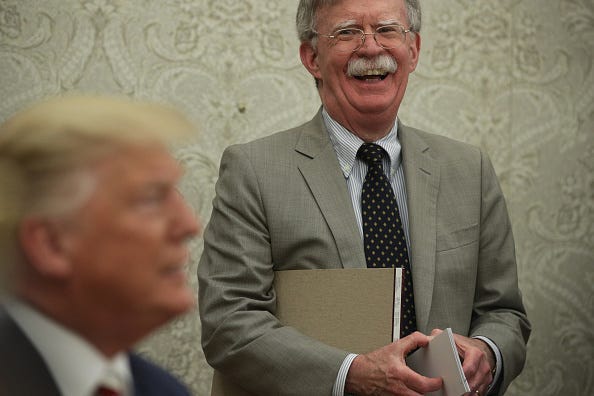
(WCCO) John Bolton, the former Donald Trump national security advisor whose book has sold 780,000 copies in the last week, told WCCO he thought he could make it work with the president despite his erratic, twisting, ad-hoc decisions.
Until he couldn't.
And now that they're enemies, Bolton says things like this about the president of the United States: He's not really a Republican.
"Look, he does not have any ideology, he's not a conservative, he's not a liberal either," Bolton told WCCO. "He doesn't think in philosophical or even policy terms. He has prejudices, instincts, quirks, but everything is focused on the impact of his political prospects ... That is what explains the herky-jerky, sporadic, anecdotal, transactional nature of his decision making. He can decide one thing in the morning one day, change it the next day, and change it back the day after that, depending on how it's greeted in the media, what his friends are telling him."
Some people like it that Trump is not a traditional president, he's a disrupter, a follower of his own rules. But Bolton said the consequences of that kind of erratic behavior is too high for the country and its international standing.
"The sort of transactional, ad hoc approach can be very dangerous ... It emboldens our adversaries," he told WCCO.
Trump and Bolton had a spectacular falling out that led to the president calling Bolton “incompetent,” a “wacko,” "a disaster," and “a disgruntled, boring fool.”
“Never had a clue, was ostracized & happily dumped. What a dope!” Trump tweeted Thursday.
For his part, Bolton has criticized the president's competence and morality. In the book "The Room Where It Happened," Bolton offered up his account of his time in the Trump administration with scenes of chaos and incompetence.
Trump's team was so incensed by the book they tried to stop it from being published on the grounds it divulged "classified information." A federal judge approved its release.
Among the claims in the book, Bolton said Trump didn't even know Great Britain was a nuclear power.
But that didn't make him quit. Bolton said he called it a day only after he realized that the president was deferential to Putin, didn't listen to briefings and gaffed with international leaders.
"I've been criticized sort of on both ends of this by people who said you should have resigned after the first 30 days or the first 60 days or pick a number, and I've been criticized by people who have said 'You had a duty not to resign.' 'You had a duty to stay in until the very end,' I suppose. There's a big alumni association of former senior advisors and office holders in the Trump administration. I know a lot of them went through the same decision making I went through. It's a very personal thing ... How long do you put up with things (you've asked about.) ... I considered resigning several time before I ultimately did. I don't think you should resign ina fit of pique. You should make the best effort you can. History will judge."
The final straw for him came when the Iranians shot down an American drone after attacking shipping in the Persian Gulf. "We had a process that if you were writing a text book of how the National Security Council should work, I think it followed that process model, and then on the spur of the moment with just a few moments to go ... somebody without any knowledge of what was actually happening militarily ... ran in and gave the president what turned out to be be incorrect information. Without engaging with anybody, else the president canceled the retaliation."
It sent a signal of weakness to Iran and others, Bolton said, adding, "I think the region would be more stable now if we had retaliated. It was presidential decision purely on whim."
Bolton's biggest headlines post-administration came when he dangled the possibility of testifying before Congress against Trump in the presidential impeachment hearings. Then he didn't testify, claiming the Democrats were being too partisan for him to participate. So, why didn't he testify to inform Republicans and Democrats in the middle -- who were truly open-minded -- and give real context for what was happening in the White House?
Bolton defended his decision not to testify, saying it wouldn't have mattered it he did.
"I tell you I don't think my testimony would have made any difference... Even if everything the Democrats said about Ukraine, or that I might have said about Ukraine were true and however reprehensible you considered the president's conduct, it did not rise to the level of an impeachable offense."
LISTEN NOW on the RADIO.COM App
Follow RADIO.COM
Facebook | Twitter | Instagram